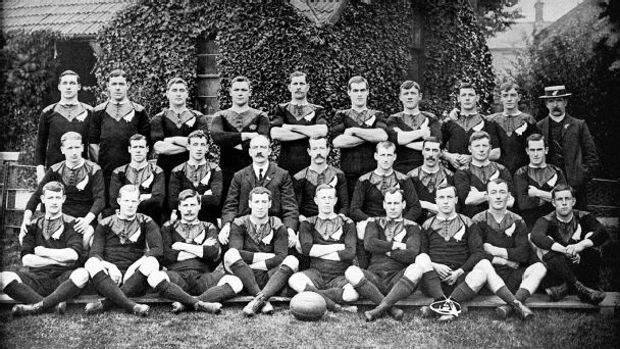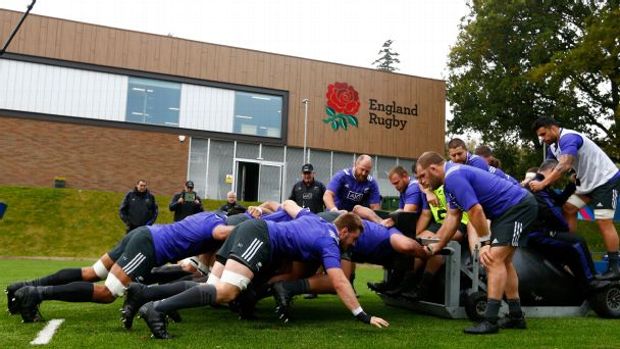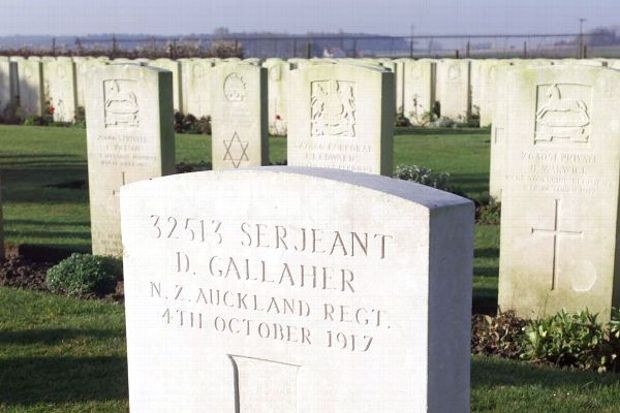|
Rugby World Cup
The 110-year-old book that made the All Blacks -- and warned modern rugby
Tom Hamilton
October 29, 2015
World Cup final: The All Blacks desperately want two in a row
The awakening should have happened 110 years ago. The All Blacks team contesting Saturday's Rugby World Cup final - a team that has lost three games since August 2011 -- is rooted in 1905. It was a vintage that boasted the two greatest oracles the sport has ever known. As the eighth World Cup draws to a close, the game would do well to remember the sentiments of Dave Gallaher and Billy Stead when they penned the prophetic The Complete Rugby Footballer in 1906. Take the opening chapter 'In the Beginning'. When talking about the state of rugby, they write: "Up to a certain point the histories of the game in the two countries [Great Britain and New Zealand] are common; but from the time when it took root in New Zealand, it has, while conforming to the rules laid down at home, pursued a line of development which has been largely its own." A century of unparalleled success followed. It is 1905; Las Vegas and Chelsea FC are founded, motor-propelled busses appear in London for the first time, Albert Einstein cracks out his theory of relativity and then 27 chaps from New Zealand docked in Plymouth to play rugby. They played 35 matches on the tour, losing once. The squad was later dubbed 'The Originals', the band of men who would be seen as the forefathers for the All Blacks we know today.  New Zealand squad for their 1905-06 tour© S&G / S&G and Barratts/EMPICS Sport After they played France on New Year's Day, 1906, the squad wandered the streets of Paris sightseeing believing they were killing time before embarking on their trip back to Aotearoa. But Prime Minister Richard Seddon had other ideas and had teed up two games against British Columbia in America. The already tiring and homesick team had an extra fortnight to kill. English publisher Henry Leach commissioned Gallaher and Stead to use the time to write the book, for which they were paid £50 each. Gallaher is already cemented as one of the game's greats and real visionaries -- his shirt from the tour recently fetched £180,000 in an auction. Stead, a bootmaker, was an indispensible member of that team, highlighted by his absence against Wales -- the only Test they lost all tour. Throughout their 322-page rugby bible, their chapters include one on how to put together a combined attack on the openside, one on lineouts and another on the scrum. But it is the chapter entitled 'Two Dangers to the Game' which is alarmingly prescient.
Distilled, the chapter highlights a pair of concerns: the role of the referee and the risk of the game going professional. Alongside their declaration "rugby in Britain is being largely strangled by the referee" is a complete evisceration of the obsession of getting a scrum completely perfect. "Somebody had perpetrated a small mistake to begin with, and a scrum was ordered, and because something went wrong with that scrum it had to be done all over again, and again, and again, and again. How are players or people to tolerate this kind of thing?" But it is their analysis of the fallibility of the official that is most relevant to this age of Craig Joubert-gate. While they clarify the referee "should be fit and properly dressed", something all professional officials can sleep easy on, the current crop may take solace in Gallaher and Stead's appraisal of their role. "The referee's lot is never a happy one. There are sometimes five or ten thousand people round the field, a majority of whom seem to be of the opinion that they could perform the duties of referee much more satisfactorily than the gentleman appointed. "The clever persons round the rails who think they could do so well if they had the whistle, would never want a second experience if they were afforded a first...and if perchance they did ever find themselves at a match, it is quite certain that wild horses would never be able to drag them on to the field of play to officiate again. "It should be remembered that lookers-on in the position of spectators are often able to see more of the game than anyone else, and they should make the necessary allowances for the circumstance."
They then turn their attention to professionalism, and its various pitfalls. As the storm intensifies over the recent Aviva Premiership salary cap shenanigans, or alleged trickeries as it is under a cloud of legal secrecy, Gallaher and Stead predicted the current arms race for players over a century ago. When talking about the Northern Union who were attempting to be a professional entity at the time, they write: "These clubs have unlimited amounts of money at their disposal to snap up any likely amateur player who they may covet. We have the names of three of their latest acquisitions in this way, one a Devonian and two Welshmen. One cannot fail to be apprehensive of the future of these men, they are long past the meridian of their success." The knackered pro searching for one last lucrative pay deal was present in 1906. They add that professionalism stunts attractive rugby with the then amateur New Zealand systems more attuned to "opener and faster" rugby; a penny for France's thoughts as they saw nine tries put on them in that quarterfinal vaporisation.  The All Blacks practise their scrum© Phil Walter/Getty Images Earlier this week New Zealand assistant coach Ian Foster was asked about England's high performance centre at Pennyhill Park, the hyper-modern fitness hothouse for the group who failed to get out of their World Cup pool. He said: "This country's got some amazing facilities and they should be very proud of them. "It doesn't prove anything. It's just different. We're in a different environment. We haven't got the ability to do that. So we have to find our own way to do things, and I'm sure they do the same here." The All Blacks are still rooted on the same principles that ran the 1905 tour: of winning, looking for ways to evolve the game and in enjoyment of its amateur values. After New Zealand's win over Namibia, they invited their opponents into their changing room for a beer. When they left, the senior players had to 'sweep the sheds', highlighting a key All Blacks value: humility.  The grave site of 1905 All Black captain Dave Gallaher© Phil Walter/Getty Images That 1906 book is further proof in this age of overblown hashtags and manufactured atmosphere that winning, an eye for perfection and self-effacement are the real, un-buyable cultural touchstones that breed success. As the All Blacks prepare for Saturday's final, one that if they win will cement their status as the game's greatest side, you can bet a mortgage on them taking stock of the journey that has led them there. It began with 27 men on an adventure 110 years ago, as Richie McCaw highlighted earlier this month when they marked the anniversary of the great Gallaher's death. "He died in the First World War and we as a team recognise he was the figure of the legacy that started where we are today. Over the years we've always made sure we understand and pay respects to that." © ESPN Sports Media Ltd. Tom Hamilton is the Associate Editor of ESPNscrum.
|
Live Sports
Communication error please reload the page.
-
Football
-
Cricket
-
Rugby
-
- Days
- Hrs
- Mins
- Secs
F1 - Abu Dhabi GP
Abu Dhabi Grand Prix December 11-131. Max Verstappen ()
2. Valtteri Bottas (Mercedes)
3. Lewis Hamilton (Mercedes)
4. Alexander Albon ()
5. Lando Norris ()
6. Carlos Sainz Jr ()
-
ESPNOtherLive >>
Snooker - China Open
Tennis - Miami Open

